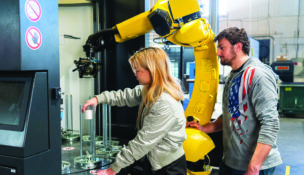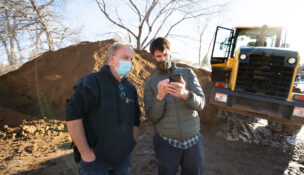Tech Startup: Taking the Clunk Out of Coworking
Montrose-based Proximity provides membership management, door access and billing for shared workspaces globally
Eric Peterson //September 26, 2018//


Tech Startup: Taking the Clunk Out of Coworking
Montrose-based Proximity provides membership management, door access and billing for shared workspaces globally
Eric Peterson //September 26, 2018//

PROXIMITY SPACE
WHERE: Montrose
FOUNDED: 2015
INITIAL LIGHT BULB:
CEO Josh Freed co-founded Proximity, a coworking space in Montrose, followed by locations in Grand Junction and Ridgway.
“It gave us a perspective on how shaky the foundations were for coworking,” says Freed, noting that most spaces use a hodgepodge of software to handle billing and other logistics. “The amount of digital duct tape in the industry is what we’re trying to correct.”
In early 2016, Freed and company began developing a single platform for in-house use. “That led to a few other spaces showing up at our door,” he says.
Proximity rolled out a beta version of the platform to 15 coworking spaces, then retooled everything in accordance with the resulting feedback and officially went to market in spring 2017. More than 170 coworking spaces with 50,000-plus members are now customers.
IN A NUTSHELL
Freed says Proximity Space handles the three big issues for coworking spaces: “membership management, door access and billing.”
But the business model prioritizes each coworking space’s members. “Their membership follows them around like a LinkedIn profile does,” Freed says. “It’s essentially built around the idea it’s the members’ platform, not necessarily the managers’,” he adds. “We help members connect to each other.”
Members also get three-day passes to other spaces that use Proximity’s platform. “In any other business model, you would see competition red flags go up,” Freed says. “This isn’t competition, this is community.”
Before Proximity, “Everything was very, very clunky,” says Aaron Landau, founder of EVO3 Workspace in Frisco, an early adopter of the platform. Before EVO3 replaced Quickbooks, Shopify, Roomzilla and other products with Proximity, he would “have to open five different apps to make any changes.”
That’s all changed. “I think there’s a lot of value just having it under one umbrella,” says Landau, giving Proximity’s conference room scheduling and internet access controls especially high marks.
Proximity charges customers a flat 5 percent fee of gross monthly sales, with no up-front fees. “We keep it really simple,” Freed says. “That includes all of their processing fees.”
He adds, “We’re constantly rolling out new features.”
In the works: An expanded job market, a subscription service called Nomad for roaming coworkers and more peer-to-peer connectivity among members.
Freed says the company is revving up a marketing push with a target of 500 customers by the end of 2018.
“To date, we have zero attrition of customers,” he says. “We have not lost a single customer to a competitor.”
THE MARKET
There are about 7,000 (and counting) coworking spaces in the U.S. and many more worldwide.
“We in the United States are in our infancy,” Freed says. “As a country, we’re in the very beginning of our adoption of coworking.”
FINANCE
Freed says the company has closed a pair of small financing rounds: one from friends and family to get the platform off the ground in 2017 and a second round of roughly $1 million in 2018.
Future financing might come in the form of another limited round or strategic partnerships. “We don’t know what direction yet,” Freed says. “We’re not big fans of ‘raise big and figure out how to spend it later.’”



























